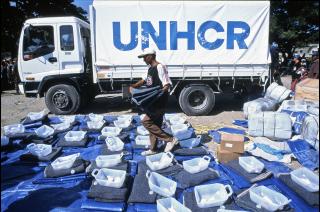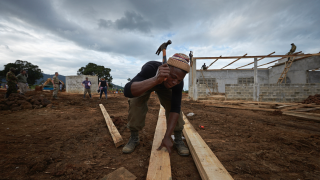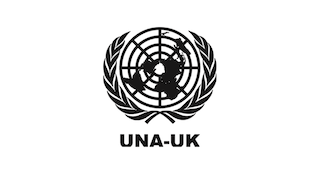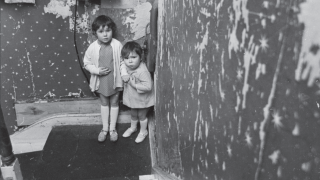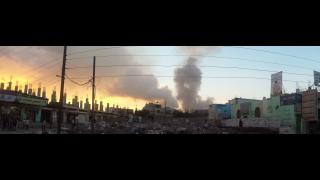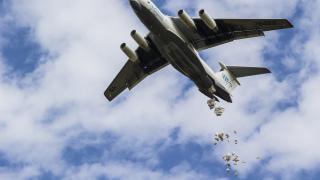This section provides an overview of the UN. It includes commentary on the organisation and its work, as well as additional information on the UN's bodies and activities.
The United Nations
The UN is an international organisation of sovereign states, containing nearly every country in the world. Only independent states may become members of the UN. It was created in the wake of World War II – in 1945, 51 states (including the UK) signed the UN Charter, and became the founding members of the UN. Because of the end of colonialism and the break-up of countries such as the USSR and Yugoslavia, the number of independent countries grew. Currently, the UN has 193 member states.
The UN provides an opportunity for the independent states of the world to discuss global issues which affect them both individually and collectively. The UN aims to seek solutions to issues, conflicts and crises in a peaceful manner. The UN Charter is a set of guidelines which explains the rights and responsibilities of member states.
The UN has four purposes, which are contained in Article 1 of the UN Charter:
- To maintain international peace and security, and to that end: to take effective collective measures for the prevention and removal of threats to the peace, and for the suppression of acts of aggression or other breaches of the peace, and to bring about by peaceful means, and in conformity with the principles of justice and international law, adjustment or settlement of international disputes or situations which might lead to a breach of the peace;
- To develop friendly relations among nations based on respect for the principle of equal rights and self-determination of peoples, and to take other appropriate measures to strengthen universal peace;
- To achieve international cooperation in solving international problems of an economic, social, cultural, or humanitarian character, and in promoting and encouraging respect for human rights and for fundamental freedoms for all without distinction as to race, sex, language, or religion; and
- To be a centre for harmonising the actions of nations in the attainment of these common ends.
Due to its unique international character, and the powers vested in its founding Charter, the UN can take action on a wide range of issues, and provide a forum for its 193 Member States to express their views, through the General Assembly, the Security Council, the Economic and Social Council and other bodies and committees.
The work of the UN reaches every corner of the globe. Although best known for peacekeeping, peacebuilding, conflict prevention and humanitarian assistance, there are many other ways the "UN System" - which includes agencies like UNICEF and the World Food Programme, as well as integovernmental bodies like the Security Council - affects our lives and makes the world a better place.
The UN works on a broad range of fundamental issues, from sustainable development, environment and refugee protection, disaster relief, counter terrorism, disarmament and non-proliferation, to promoting democracy, human rights, gender equality and the advancement of women, governance, economic and social development and international health, clearing landmines, expanding food production, and more, in order to achieve its goals and coordinate efforts for a safer world for this and future generations.
Principles
The purposes are upheld by certain principles, contained in Article 2 of the UN Charter, which apply to the UN as an organisation and to the individual member states:
- The Organization is based on the principle of the sovereign equality of all its Members.
- All Members, in order to ensure to all of them the rights and benefits resulting from membership, shall fulfil in good faith the obligations assumed by them in accordance with the present Charter.
- All Members shall settle their international disputes by peaceful means in such a manner that international peace and security, and justice, are not endangered.
- All Members shall refrain in their international relations from the threat or use of force against the territorial integrity or political independence of any state, or in any other manner inconsistent with the Purposes of the United Nations.
- All Members shall give the United Nations every assistance in any action it takes in accordance with the present Charter, and shall refrain from giving assistance to any state against which the United Nations is taking preventive or enforcement action.
- The Organization shall ensure that states which are not Members of the United Nations act in accordance with these Principles so far as may be necessary for the maintenance of international peace and security.
- Nothing contained in the present Charter shall authorize the United Nations to intervene in matters which are essentially within the domestic jurisdiction of any state or shall require the Members to submit such matters to settlement under the present Charter; but this principle shall not prejudice the application of enforcement measures under Chapter Vll.
The UN Charter provides for the suspension or expulsion of a member state which does not adhere to the Charter principles. This has not happened so far, but South Africa ‘suspended itself’ by withdrawing when the country was run under the apartheid system.
Main UN bodies
The main UN bodies are established by the UN Charter. Underneath these bodies are many subsidiary organs.
The General Assembly
The General Assembly is the main deliberative organ of the United Nations. It is composed of representatives of all member states, each of which has one vote. Decisions on important questions, such as those on peace and security, admission of new members and budgetary matters, require a two-thirds majority. Decisions on other questions are by simple majority.
There are various subsidiary organs within the General Assembly. These include the Disarmament Commission, the Peacebuilding Commission and the Human Rights Council.
For details of the functions and powers of the General Assembly, when it meets, and the ways in which decisions are taken, click here.
Security Council
The Security Council has primary responsibility for the maintenance of international peace and security. It is so organised as to be able to function continuously, and a representative of each of its members must be present at all times at United Nations Headquarters. The Presidency of the Council rotates monthly, according to the English alphabetical listing of its member States.
The Security Council’s functions and powers are:
- To maintain international peace and security in accordance with the principles and purposes of the United Nations;
- To investigate any dispute or situation which might lead to international friction;
- To recommend methods of adjusting such disputes or the terms of settlement;
- To formulate plans for the establishment of a system to regulate armaments;
- To determine the existence of a threat to the peace or act of aggression and to recommend what action should be taken;
- To call on Members to apply economic sanctions and other measures not involving the use of force to prevent or stop aggression;
- To take military action against an aggressor;
- To recommend the admission of new Members;
- To exercise the trusteeship functions of the United Nations in "strategic areas"; and
- To recommend to the General Assembly the appointment of the Secretary-General and, together with the Assembly, to elect the Judges of the International Court of Justice.
There are five permanent members of the Security Council – China, France, the Russian Federation, the United Kingdom and the United States. There are ten non-permanent members who serve two-year terms and are elected by the General Assembly in regional groups, to ensure that each region is represented. Click here to see the current non-permanent members.
There is much criticism that the permanent five members represent the most powerful countries from 1945, rather than today, and that they do not represent the world geographically.
For more information about the Security Council, click here.
Secretary-General
Equal parts diplomat and advocate, civil servant and CEO, the Secretary-General is a symbol of United Nations ideals and a spokesman for the interests of the world's peoples, in particular the poor and vulnerable among them. The current Secretary-General, and the eighth occupant of the post, is Mr Ban Ki-moon of the Republic of Korea, who took office on 1 January 2007.
The Charter describes the Secretary-General as "chief administrative officer" of the Organization, who shall act in that capacity and perform "such other functions as are entrusted" to him or her by the Security Council, General Assembly, Economic and Social Council and other United Nations organs. The Charter also empowers the Secretary-General to "bring to the attention of the Security Council any matter which in his opinion may threaten the maintenance of international peace and security".
These guidelines both define the powers of the office and grant it considerable scope for action. The Secretary-General would fail if he did not take careful account of the concerns of Member States, but he must also uphold the values and moral authority of the United Nations, and speak and act for peace, even at the risk, from time to time, of challenging or disagreeing with those same Member States.
Each year, the Secretary-General issues a report on the work of the United Nations that appraises its activities and outlines future priorities. The Secretary-General is also Chairman of the Administrative Committee on Coordination (ACC), which brings together the Executive Heads of all UN funds, programmes and specialised agencies twice a year in order to further coordination and cooperation in the entire range of substantive and management issues facing the United Nations System.
One of the most vital roles played by the Secretary-General is the use of his "good offices" - steps taken publicly and in private, drawing upon his independence, impartiality and integrity, to prevent international disputes from arising, escalating or spreading.
The Secretary-General is appointed by the General Assembly, on the recommendation of the Security Council. The Secretary-General's selection is therefore subject to the veto of any of the five permanent members of the Security Council.
The Secretariat
This is an international staff working in duty stations around the world that carry out the diverse day-to-day work of the Organization. It services the other principal organs of the United Nations and administers the programmes and policies laid down by them.
The duties carried out by the Secretariat are as varied as the problems dealt with by the United Nations. These range from administering peacekeeping operations to mediating international disputes, from surveying economic and social trends and problems to preparing studies on human rights and sustainable development.
Secretariat staff also inform the world's communications media about the work of the United Nations; organise international conferences on issues of worldwide concern; and interpret speeches and translate documents into the Organisation's official languages.
As of 30 June 2010, the Secretariat had some 44,000 staff members around the world. For information on the departments of the Secretariat, click here.
Economic and Social Council (ECOSOC)
The Economic and Social Council is the principal body coordinating the economic and social work of the United Nations and its operational arms. It is serviced by the Department for Economic and Social Affairs. The entire family of United Nations organizations works for economic, social and sustainable development.
Many UN agencies and programmes work closely with ECOSOC. The agencies are all independent organisations, with their own member countries and budgets. Many UN programmes were created by the General Assembly and work closely with ECOSOC, but report to the General Assembly and/or the Security Council.
The Council's 54 member Governments are elected by the General Assembly for overlapping three-year terms. Seats on the Council are allotted based on geographical representation with fourteen allocated to African States, eleven to Asian States, six to Eastern European States, ten to Latin American and Caribbean States, and thirteen to Western European and other States.
The work of ECOSOC is carried out through Functional and Regional Commissions. Functional Commissions address specific topics, whereas Regional Commissions address issues specific to certain geographic areas. Commissions have working groups and other sections to research, discuss and investigate problems. These are made up of member countries’ representatives, but draw on independent experts for information and advice.
For information about the UN’s economic and social development work, click here.
International Court of Justice (ICJ)
The ICJ is not the same as the International Criminal Court (ICC). The ICC hears cases against individuals accused of genocide, crimes against humanity and war crimes. The ICJ hears only disputes between states.
The ICJ is the principal judicial organ of the United Nations. It was established in June 1945 by the Charter of the United Nations and began work in April 1946. The seat of the Court is at the Peace Palace in The Hague, Netherlands. Of the six principal organs of the United Nations, it is the only one not located in New York.
The Court’s role is to settle, in accordance with international law, legal disputes submitted to it by States and to give advisory opinions on legal questions referred to it by authorised United Nations organs and specialised agencies. For information on cases currently before the Court, click here.
The Court is composed of 15 judges, who are elected for terms of office of nine years by the United Nations General Assembly and the Security Council. It is assisted by a Registry, its administrative organ. For information on the history of the Court, click here.
- The Trusteeship Council was established in 1945 by the UN Charter to provide international supervision for 11 Trust Territories placed under the administration of 7 Member States, and ensure that adequate steps were taken to prepare the Territories for self-government and independence. By 1994, all Trust Territories had attained self-government or independence. Its work completed, the Council has amended its rules of procedure to meet as and where occasion may require.
Other parts of the UN
In addition to the six 'principal organs' outlined above, the UN system includes a number of other committees, funds, programmes and agencies. The work of some of these bodies is often featured in the news - the World Health Organization, UN Refugee Agency and World Food Programme, for example. Others are less well known. Those featured below give a flavour of the breadth of the UN's activities.
- The Human Rights Council is an intergovernmental UN body made up of 47 states. It is responsible for the promotion and protection of human rights around the globe. The UN High Commissioner for Human Rights is the UN official tasked with this mandate. The Commissioner supports the work of the Council and UN's human rights treaties.
- The International Telecommunication Union is the UN's specialised agency for information and communications technnology. It works on issues such as access to the internet and internet governance, the allocation of radio spectrum and satellite orbits, and connections between telephone networks around the world.
- The International Civil Aviation Organization is the UN agency responsible for aviation regulations and practices. It ensures that today's air transport network - which operates nearly 100,000 flights a day - operates safely and effectively.
- The UN Office on Drugs and Crime leads global efforts to fight illicit drugs, organised crime and terrorism.
- The UN Office for Outer Space Affairs promotes international cooperation on the peaceful uses of outer space. It maintains a register of objects launched into space, provides training on technology, and helps to provide satellite images during natural disasters.
Finance
The work of the UN is financed by member countries through three budgets: the regular budget, the peacekeeping budget and ‘voluntary funding’.
Payments towards the regular budget are compulsory for all nations, although these differ widely. For example, in 2006, the UK was assessed at 6.13% of the annual budget, whereas Liberia was assessed at 0.001%. Payments towards the peacekeeping budget are not required for the poorest nations; to make up for this, the five permanent members of the Security Council (China, France, the Russian Federation, the United Kingdom and the United States) make extra payments.
If a member state becomes two years behind with these compulsory dues, it loses its vote in the General Assembly (although the General Assembly can vote to relax this requirement in individual cases). Many states routinely make late payments, making it very hard for the UN to carry out its work.
‘Voluntary funding’ is used to finance the UN’s development and humanitarian programmes, such as the UN Children’s Fund. Countries may choose which, if any, of these programmes they wish to fund.
Commentary on the UN
The founding of the United Nations in 1945 symbolised the hope of a war-weary generation for a new era of international cooperation that would bring peace and progress to humankind. This promise has been partially fulfilled. The UN has presided over significant advances in international law; developed mechanisms for peacekeeping; built programmes for poverty alleviation; and facilitated the peaceful transition to independence of scores of former colonies, radically changing the make-up of today's world.
But many have been left behind. While the UN has helped to foster economic and social development, major disparities remain within and between countries. One fifth of the world’s population still subsists on less than £1 of income a day and millions lack access to basic necessities. And a mixed record in resolving conflict and preventing mass atrocities has blighted the organisation’s reputation.
At a time when many countries are turning their attention inward to domestic concerns, some commentators have predicted the demise of the UN. Others counter this view with descriptions of the organisation’s indispensability in a rapidly globalising and interconnected world.
The truth is somewhere in between. The UN will never fulfil the hopes of its most fervent advocates and its inevitable mistakes will continue to provide fuel for its detractors. But as a place for nations to convene, as a setter of important global norms, and as a provider of key services from emergency food relief to human rights monitors and peacekeepers, the UN will surely remain a significant actor as it approaches its 70th birthday.
Unlike its predecessor, the League of Nations, it has proved resilient and adaptable, surviving repeated divisions among its members, and the emergence of other multilateral bodies. This is because the story of the UN is not merely that of its constituent parts. It is the story of the 'international community'. By combining broad membership with privileges for the powerful, by giving smaller and poorer states a platform and voice, and by working with new actors such as NGOs and businesses, the UN has managed to foster the development of an 'international community', which is now expected to address both immediate crises and longer-term problems.
There is certainly no shortage of challenges that require international cooperation; the United Nations, both flawed and indispensible, will continue to be called upon.
Links to short articles and talking points
The enduring myth of the UN - Natalie Samarasinghe, UNA-UK Executive Director
Is the UN fit for purpose? Mark Seddon, UN speechwriter, and author Adam LeBor battle it out
What's wrong with the UN? - Thomas G. Weiss, City University New York
Other international organisations
A number of other international bodies are not strictly UN bodies, but were established within the UN family. These include the International Monetary Fund, World Bank and International Criminal Court.
States may also be members of many different international organisations. Here are a few of the most important ones:
African Union (AU)
Association of Southeast Asian Nations (ASEAN)
Commonwealth of Independent States (CIS)
Economic Community of West African States (ECOWAS)
European Union (EU)
Group of 8 (G8)
Group of 77 (G77)
North Atlantic Treaty Organisation (NATO)
Non-Aligned Movement (NAM)
Organisation for Economic Co-operation and Development (OECD)
Organization for Security and Co-operation in Europe (OSCE)
Organisation of the Petroleum Exporting Countries (OPEC)
Organisation of the Islamic Conference
Banner: A UN Refugee Agency (UNHCR) worker prepares repatriation kits for internally displaced persons returning home in East Timor in 1999. The kits include plastic sheeting, a blanket, a gerrycan and soap. (UN Photo/UNHCR/M Kobayashi)

